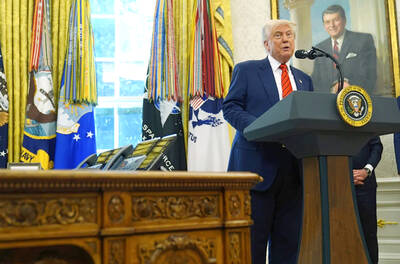The US House of Representatives on Friday voted to expel US Representative George Santos of New York after a blistering ethics report on his conduct heightened lawmakers’ concerns about the scandal-plagued freshman, who became just the sixth member in the chamber’s history to be ousted by colleagues, and the third since the Civil War.
The vote to expel was 311-114, easily clearing the two-thirds majority required. House Republican leaders opposed removing Santos, whose departure leaves them with a razor-thin majority, but in the end 105 Republican lawmakers sided with nearly all Democrats to expel him.
The expulsion marked the final congressional chapter in a spectacular fall from grace for Santos. Celebrated as an up-and-comer after he flipped a district from Democrats last year, Santos’ life story began to unravel before he was even sworn into office. Reports emerged that he had lied about having Jewish ancestry, a career at top Wall Street firms and a college degree, among other things.

Photo: AFP
In May, Santos was indicted by federal prosecutors on multiple charges, turning his presence in the House into a growing distraction and embarrassment to the party.
Santos joins a short list of lawmakers expelled from the House, and for reasons uniquely his own. Of the previous expulsions in the House, three were for siding with the Confederacy during the Civil War. The remaining two occurred after the lawmakers were convicted of crimes in federal court, the most recent in 2002.
Seeking to remain in office, Santos had appealed to colleagues to let the court process play out. He warned of the precedent they would set by expelling a member not yet convicted of a crime.
“This will haunt them in the future,” Santos told lawmakers on Thursday evening as they debated his removal.
His fellow Republicans from New York were front and center in the effort to boot him, seeking to generate as much political distance as they could from Santos, whose lies about his past made him a pariah in the House before he even took the oath of office.
“Every precedent under the sun has been broken by George Santos,” US Representative Nick Langworthy said. “Has there ever been anyone here that’s made up a whole life?”
Santos had survived two previous expulsion attempts, but a scathing House Ethics Committee report released the week before the Thanksgiving holiday appeared to turn colleagues decisively against him.
After eight months of work, Ethics Committee investigators said they had found “overwhelming evidence” that Santos had broken the law and exploited his public position for his own profit.
Santos’ troubles are far from over, as he faces a trial next year in New York. Federal prosecutors in a 23-count indictment have accused him of duping donors, stealing from his campaign and lying to the US Congress.
The indictment alleges specifically that Santos stole the identities of campaign donors and then used their credit cards to make tens of thousands of dollars in unauthorized charges.
He then wired some of the money to his personal bank account and used the rest to pad his campaign coffers, prosecutors say. Santos has pleaded not guilty,
Santos’ expulsion narrows the Republican Party’s majority to 221-213 and Democrats would have a good opportunity to fill the vacancy in a special election for the seat.

A new online voting system aimed at boosting turnout among the Philippines’ millions of overseas workers ahead of Monday’s mid-term elections has been marked by confusion and fears of disenfranchisement. Thousands of overseas Filipino workers have already cast their ballots in the race dominated by a bitter feud between President Ferdinand Marcos Jr and his impeached vice president, Sara Duterte. While official turnout figures are not yet publicly available, data from the Philippine Commission on Elections (COMELEC) showed that at least 134,000 of the 1.22 million registered overseas voters have signed up for the new online system, which opened on April 13. However,

ALLIES: Calling Putin his ‘old friend,’ Xi said Beijing stood alongside Russia ‘in the face of the international counter-current of unilateralism and hegemonic bullying’ Chinese President Xi Jinping (習近平) yesterday was in Moscow for a state visit ahead of the Kremlin’s grand Victory Day celebrations, as Ukraine accused Russia’s army of launching air strikes just hours into a supposed truce. More than 20 foreign leaders were in Russia to attend a vast military parade today marking 80 years since the defeat of Nazi Germany in World War II, taking place three years into Russia’s offensive in Ukraine. Putin ordered troops into Ukraine in February 2022 and has marshaled the memory of Soviet victory against Nazi Germany to justify his campaign and rally society behind the offensive,

CONFLICTING REPORTS: Beijing said it was ‘not familiar with the matter’ when asked if Chinese jets were used in the conflict, after Pakistan’s foreign minister said they were The Pakistan Army yesterday said it shot down 25 Indian drones, a day after the worst violence between the nuclear-armed rivals in two decades. Pakistani Prime Minister Shehbaz Sharif vowed to retaliate after India launched deadly missile strikes on Wednesday morning, escalating days of gunfire along their border. At least 45 deaths were reported from both sides following Wednesday’s violence, including children. Pakistan’s military said in a statement yesterday that it had “so far shot down 25 Israeli-made Harop drones” at multiple location across the country. “Last night, India showed another act of aggression by sending drones to multiple locations,” Pakistan military spokesman Ahmed

US President Donald Trump on Wednesday said that he would make a decision about how the US government would refer to the body of water commonly known as the Persian Gulf when he visits Arab states next week. Trump told reporters at the White House that he expects his hosts in Saudi Arabia, Qatar and the United Arab Emirates will ask him about the US officially calling the waterway the Arabian Gulf or Gulf of Arabia. “They’re going to ask me about that when I get there, and I’ll have to make a decision,” Trump said. “I don’t want to hurt anybody’s